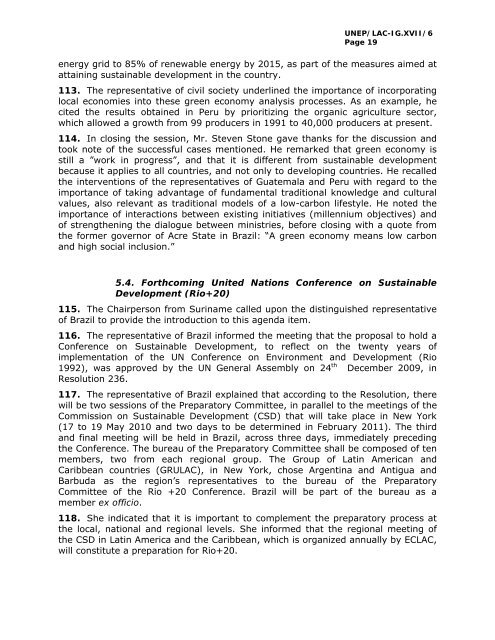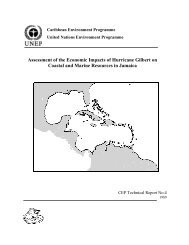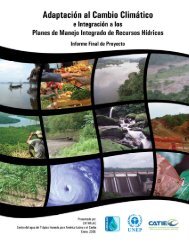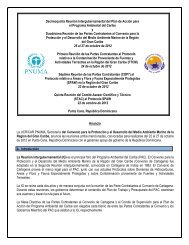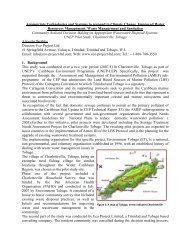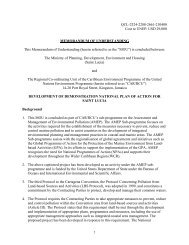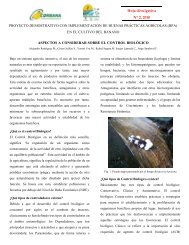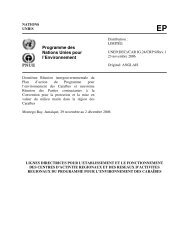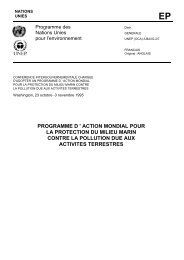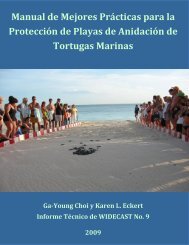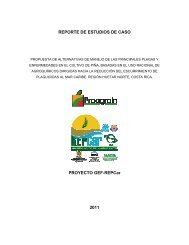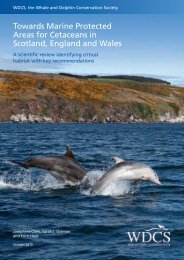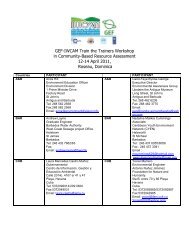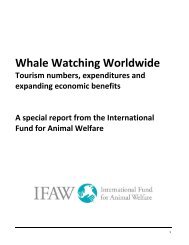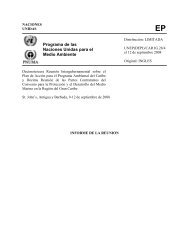English - Programa de Naciones Unidas para el Medio Ambiente
English - Programa de Naciones Unidas para el Medio Ambiente
English - Programa de Naciones Unidas para el Medio Ambiente
- No tags were found...
Create successful ePaper yourself
Turn your PDF publications into a flip-book with our unique Google optimized e-Paper software.
UNEP/LAC-IG.XVII/6Page 19energy grid to 85% of renewable energy by 2015, as part of the measures aimed atattaining sustainable <strong>de</strong>v<strong>el</strong>opment in the country.113. The representative of civil society un<strong>de</strong>rlined the importance of incorporatinglocal economies into these green economy analysis processes. As an example, hecited the results obtained in Peru by prioritizing the organic agriculture sector,which allowed a growth from 99 producers in 1991 to 40,000 producers at present.114. In closing the session, Mr. Steven Stone gave thanks for the discussion andtook note of the successful cases mentioned. He remarked that green economy isstill a ”work in progress”, and that it is different from sustainable <strong>de</strong>v<strong>el</strong>opmentbecause it applies to all countries, and not only to <strong>de</strong>v<strong>el</strong>oping countries. He recalledthe interventions of the representatives of Guatemala and Peru with regard to theimportance of taking advantage of fundamental traditional knowledge and culturalvalues, also r<strong>el</strong>evant as traditional mo<strong>de</strong>ls of a low-carbon lifestyle. He noted theimportance of interactions between existing initiatives (millennium objectives) andof strengthening the dialogue between ministries, before closing with a quote fromthe former governor of Acre State in Brazil: “A green economy means low carbonand high social inclusion.”5.4. Forthcoming United Nations Conference on SustainableDev<strong>el</strong>opment (Rio+20)45115. The Chairperson from Suriname called upon the distinguished representativeof Brazil to provi<strong>de</strong> the introduction to this agenda item.116. The representative of Brazil informed the meeting that the proposal to hold aConference on Sustainable Dev<strong>el</strong>opment, to reflect on the twenty years ofimplementation of the UN Conference on Environment and Dev<strong>el</strong>opment (Rio1992), was approved by the UN General Assembly on 24 th December 2009, inResolution 236.117. The representative of Brazil explained that according to the Resolution, therewill be two sessions of the Pre<strong>para</strong>tory Committee, in <strong>para</strong>ll<strong>el</strong> to the meetings of theCommission on Sustainable Dev<strong>el</strong>opment (CSD) that will take place in New York(17 to 19 May 2010 and two days to be <strong>de</strong>termined in February 2011). The thirdand final meeting will be h<strong>el</strong>d in Brazil, across three days, immediat<strong>el</strong>y precedingthe Conference. The bureau of the Pre<strong>para</strong>tory Committee shall be composed of tenmembers, two from each regional group. The Group of Latin American andCaribbean countries (GRULAC), in New York, chose Argentina and Antigua andBarbuda as the region’s representatives to the bureau of the Pre<strong>para</strong>toryCommittee of the Rio +20 Conference. Brazil will be part of the bureau as amember ex officio.118. She indicated that it is important to complement the pre<strong>para</strong>tory process atthe local, national and regional lev<strong>el</strong>s. She informed that the regional meeting ofthe CSD in Latin America and the Caribbean, which is organized annually by ECLAC,will constitute a pre<strong>para</strong>tion for Rio+20.


